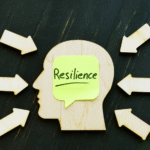6:45 AM. You’re getting ready for another day of being “fine.”
You check yourself in the mirror – not for vanity, but to make sure the mask is in place. The one that says you’ve got it all handled. The one that hides the weight you’re carrying, the doubts that keep you awake, the feeling that you’re failing at this whole “being a man” thing.
This isn’t another post telling you to “just talk about your feelings.” This is about what happens in those moments when the armor gets too heavy to carry.
We need to talk about those moments.
Because right now, somewhere, a man is putting on his work clothes, checking his phone, and stepping into his role as provider, protector, problem-solver. He’s carrying more than just his responsibilities. He’s carrying the weight of expectations that were placed on him before he could even walk. The pressure to be strong, successful, unshakeable. The fear that admitting struggle means admitting failure.
Every man knows these contradictions:
- We’re told to be vulnerable but punished when we show weakness
- We’re expected to have all the answers while feeling completely lost
- We’re supposed to be the rock for everyone else while crumbling inside
- We’re praised for our strength but never taught how to ask for help when it fails us
Society doesn’t talk enough about what it’s like to carry the weight of everyone’s expectations while your own world is falling apart. About the mental gymnastics of being strong for your family while questioning if you’re enough. About maintaining that steady exterior while everything inside is chaos.
But here’s what matters: These feelings don’t make you less of a man. They make you human.
That sense that you’re not living up to what’s expected? We all feel it. The fear of being seen as weak if you admit you’re struggling? It’s universal. The guilt of having what looks like a good life but still feeling empty? You’re not alone in that either.
Have you found yourself sitting in your car after work, any of these thoughts running through your head? Maybe they hit you in the shower, or lying in bed staring at the ceiling at 2 AM. I hear them from every man I talk to during coaching sessions, see them in the messages that come through at all hours. They’re the thoughts that visit when the world goes quiet and there’s nowhere left to hide:
- “Why can’t I just handle this like a real man should?”
- “Everyone’s counting on me – what happens if I fall apart?”
- “I feel like I’m failing at everything that matters, but I can’t let anyone see it”
- “How do I tell my family I’m drowning when they need me to be their anchor?”
- “Am I being selfish for wanting something different, something more?”
- “Why do I feel so angry all the time, and why can’t I control it?”
- “When did I become this person I don’t even recognize?”
Your ability to keep going despite these battles? That’s not just toughness. That’s courage.
Because the truth is, being a man in this world isn’t simple. We’ve been handed a rulebook written by people who never had to live by it. Rules that say real men don’t cry, don’t ask for help, don’t show fear. Rules that were written to break us, not build us.
The skills you think you lack – the ability to express emotion, to ask for support, to be vulnerable – these aren’t weaknesses. They’re muscles that were never allowed to develop. And just like any muscle, they can be strengthened with practice.
To the man who’s questioning everything:
- Your struggles don’t define your worth
- Your need for help doesn’t diminish your strength
- Your emotions don’t make you weak
- Your questions about who you’re supposed to be don’t make you less of a man
The power isn’t in pretending you’re invincible. It’s in acknowledging the weight you carry while still choosing to move forward. It’s in understanding that the very things that make this harder for us as men are often the things that, once faced, make us stronger.
You’re not broken. The system that told you to carry everything alone is broken.
But let’s talk about something harder.
We’re losing too many good men to suicide. Three times more men than women take their own lives, and it’s not because we’re naturally more fragile. It’s because we’ve been taught that suffering in silence is strength, that asking for help is failure, that breaking down means you’re not man enough.
If you’re in that dark place right now – where the weight feels unbearable, where you can’t see past tomorrow, where ending it all seems like the only way to stop the pain – please reach out. Send me a WhatsApp. Call someone. Anyone! Because that voice telling you everyone would be better off without you? It’s lying. The people who love you don’t need you to be perfect. They need you to be alive.
Sometimes the strongest thing you can do isn’t pushing through alone – it’s admitting you need backup.
Here’s what took me too long to understand: Taking care of your mental health isn’t something you do when you’ve got time or when things get really bad. It’s as essential as showing up to work or paying your bills. Because this isn’t just about surviving – it’s about building a life where you can actually breathe.
Your mental health affects everything. Your relationships, your work, your ability to be the father, partner, friend, son you want to be. You can’t give what you don’t have, and you can’t be strong for others if you’re falling apart inside.
And to the men reading this who think they’re too far gone, too damaged, too set in their ways – bullshit. I’ve seen men in their 60s learn to express emotion for the first time. I’ve watched fathers rebuild relationships with their kids by admitting they didn’t have all the answers. I’ve seen guys who thought therapy was for “other people” discover it was exactly what they needed.
The old ways of being a man – the silent suffering, the emotional shutdown, the “man up” mentality – they’re not working. They never really worked. They just made us good at hiding how much we were hurting.
To the young men out there trying to figure out what manhood even means anymore – the world’s changing, and that’s not a bad thing. You don’t have to choose between being strong and being real. You don’t have to sacrifice your humanity to prove your masculinity.
Whether you’re dealing with depression, anxiety, anger, grief, or just the crushing weight of expectations – you don’t have to carry it alone. You don’t have to wait until you’re in crisis. Sometimes just talking to someone who gets it makes all the difference.
And to the partners, friends, and family members reading this – the men in your life aren’t broken for struggling. They’re not weak for needing support. They’re fighting battles they were never taught how to fight, carrying weights they were told were theirs alone to bear.
Here’s what I know after years of my own struggle and hundreds of conversations with men who thought they were alone: The strongest men aren’t the ones who never fall down. They’re the ones who get back up and help others do the same.
The next evolution of masculinity isn’t about going soft – it’s about being smart enough to know that strength includes knowing when to ask for help. Real men feel deeply, love fiercely, and aren’t afraid to show it.
That’s not weak masculinity.
That’s intelligent masculinity.
That’s what separates the men who thrive from those who just survive.
Look after yourself.







